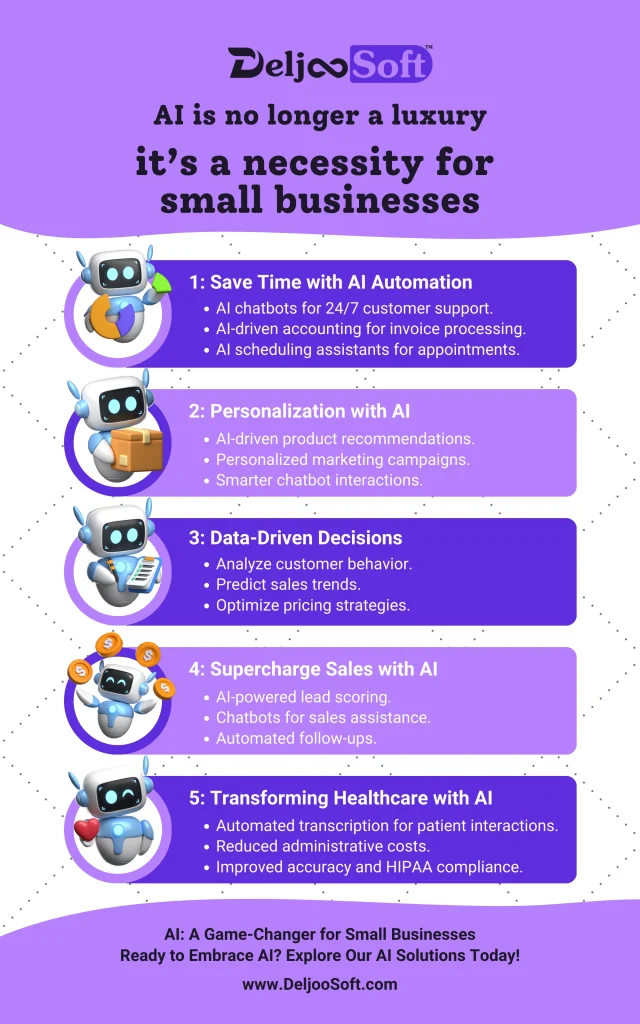In today’s fast-paced digital landscape, AI for small businesses is no longer a luxury—it’s a necessity. Small businesses must adopt innovative technologies like Artificial Intelligence (AI) to stay competitive. AI for small businesses has become accessible and affordable, enabling companies of all sizes to improve efficiency, enhance customer experiences, and drive growth. Here’s how AI for small businesses can provide a competitive advantage with real-world examples and actionable insights.

1. Automating Repetitive Tasks to Save Time
One of the biggest advantages of AI for small businesses is automation. Small businesses often operate with limited staff and resources, making time efficiency crucial. AI-powered tools can automate repetitive tasks such as:
- Email Responses & Customer Support: AI chatbots can handle common customer inquiries 24/7, reducing response times and freeing up human agents for more complex queries.
- Invoice Processing & Bookkeeping: AI-driven accounting software can automatically categorize expenses, generate reports, and even predict cash flow trends.
- Appointment Scheduling: AI scheduling assistants can handle meeting coordination without back-and-forth emails.
Example: A small law firm implemented AI-driven scheduling software to manage client consultations, reducing administrative workload by 40% and increasing billable hours.
2. Enhancing Customer Experience with Personalization
AI for small businesses enables hyper-personalized experiences, improving customer satisfaction and loyalty. By analyzing customer data, AI can:
- Recommend Products or Services: AI-driven recommendation engines suggest products based on browsing and purchase history.
- Personalize Marketing Campaigns: AI tools can segment customers and tailor emails, promotions, and ads for higher engagement.
- Improve Chatbot Interactions: AI chatbots learn from customer conversations to provide more accurate and helpful responses over time.
Example: A boutique fashion retailer used AI-powered email marketing to send tailored product recommendations, leading to a 25% increase in sales conversions.
3. Gaining Actionable Insights with AI-Driven Analytics
Understanding data is crucial for small businesses to make informed decisions for small businesses powers analytics tools that can:
- Analyze Customer Behavior: AI-driven tools track website user interactions, helping businesses optimize their digital presence.
- Predict Sales Trends: AI-driven CRM tools analyze past sales data to predict future customer behavior and sales cycles.
- Optimize Pricing Strategies: AI can dynamically adjust pricing based on demand, competitor prices, and market trends.
Example: A small SaaS company used AI-driven analytics to identify customer churn patterns, allowing them to implement retention strategies that reduced churn by 15%.
4. Improving Lead Generation and Sales
AI can supercharge lead generation and sales efforts by:
- Scoring and Prioritizing Leads: AI-powered CRM tools analyze customer interactions to identify the most promising leads.
- Chatbots for Sales Assistance: AI chatbots can engage website visitors, answer product questions, and even complete sales transactions.
- Automating Follow-Ups: AI tools send personalized follow-up emails and messages, ensuring potential leads don’t go cold.
Example: A real estate agency implemented an AI chatbot to pre-qualify leads, resulting in a 30% increase in appointment bookings.
5. Enhancing Healthcare Efficiency with AI Scribes
AI for small businesses can also transform industries like healthcare by reducing administrative burdens and improving patient care. AI-powered medical scribes like DelVoice automate clinical documentation, allowing doctors and nurses to focus more on patient care rather than paperwork.
- Automated Transcription: Delvoice records and transcribes patient interactions in real-time, eliminating manual note-taking.
- Reduced Administrative Costs: By automating documentation, hospitals and clinics can save thousands in labor costs.
- Improved Accuracy: AI-powered scribes reduce errors and inconsistencies in medical records, improving compliance and patient outcomes.
- HIPAA Compliance: Delvoice ensures that all patient data is securely handled, meeting strict HIPAA regulations for data privacy and security.
Example: A mid-sized clinic implemented Delvoice AI scribe technology, reducing documentation time by 60% and saving annually in administrative costs.
Getting Started with AI for Your Small Business
If you’re ready to leverage AI for your small businesses, here are some steps to get started:
- Identify Pain Points – Determine which areas of your business could benefit most from AI automation or intelligence.
- Start Small – Implement AI in one area, such as customer service chatbots or email automation, before expanding to other applications.
- Choose the Right Tools – Research and invest in AI tools that fit your business needs and budget.
- Monitor and Optimize – Continuously track AI’s impact on your business and adjust strategies as needed.
Final Thoughts
AI is no longer a futuristic concept; it’s a game-changer for small businesses looking to compete with larger companies. By automating tasks, enhancing customer experiences, improving data analysis, and strengthening security, AI for small businesses can help companies thrive in a competitive market. The key is to start small, experiment, and scale as you see the benefits.
Are you ready to embrace AI for small businesses? Explore our Data and AI services to discover how we can help you implement AI solutions tailored to your needs.

